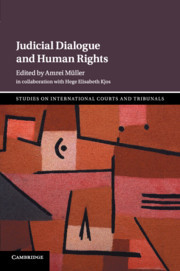Description
Judicial Dialogue and Human Rights
Studies on International Courts and Tribunals Series
Coordinator: Müller Amrei
A comprehensive analysis of the extent, method, purpose and effects of domestic and international courts' judicial dialogue on human rights.
Language: English
Subject for Judicial Dialogue and Human Rights:
Judicial Dialogue and Human Rights
Publication date: 12-2018
Support: Print on demand
Publication date: 12-2018
Support: Print on demand
Judicial Dialogue and Human Rights
Publication date: 05-2017
Support: Print on demand
Publication date: 05-2017
Support: Print on demand
Description
/li>Contents
/li>Biography
/li>
This book offers a comprehensive analysis of the extent, method, purpose and effects of domestic and international courts' judicial dialogue on human rights. The analysis covers national courts' judicial dialogue from different regions of the world, including Eastern Europe, Latin America, Canada, Nigeria and Malaysia. The text is complemented by studies on specific subject matters such as LGTBI people's and asylum seekers' rights that further contribute to a better understanding of factors that stimulate or hold back judicial dialogue, and by first hand insights of domestic and European Court of Human Rights judges into their courts' involvement in judicial dialogue. The book features contributions from leading scholars and judges, whose combined perspectives provide an interesting and timely study.
1. Introduction. Judicial dialogue and human rights Amrei Müller and Hege Elisabeth Kjos; 2. Judicial dialogue on international human rights law in Poland and Eastern Europe Izabela Skomerska Muchowska; 3. Horizontal judicial dialogue on human rights: the practice of constitutional courts in South America Michael Freitas Mohallem; 4. The Supreme Court of Canada's Transnational Judicial Communication on Human Rights (1982–2014): an empirical assessment Gianluca Gentili and Elaine Mak; 5. Ideological barriers to judicial dialogue: a study of the laws establishing Sharī'ah courts in Malaysia and Nigeria Azizat O. Amoloye-Adebayo; 6. Complementary protection and domestic courts: the extent, method, purpose and effects of judicial dialogue Naomi Hart; 7. The construction of same-sex families in Western Europe through legislative and judicial dialogues: the role of national legislatures and supranational courts Daniele Gallo and Matteo M. Winkler; Part I. Reports on Practice: Domestic Judges: 8. Engaging in judicial dialogue: some reflections from the United Kingdom Supreme Court The Right Hon. Lord Carnwath of Notting Hill; 9. Engaging in judicial dialogue: the practice of the German Federal Constitutional Court Andreas Paulus; 10. Judicial dialogue: the experience of Italy Raffaele Sabato; 11. The ECtHR's engagement with German and Russian courts' decisions: encouraging effective cooperation to secure ECHR rights Amrei Müller; 12. Encouraging judicial dialogue: the contribution of human rights NGOs' briefs to the European Court of Human Rights Laura Van Den Eynde; Part II. Reports on Practice: ECtHR Judges: 13. Dialogues between the Strasbourg Court and national courts: a note Luis López Guerra; 14. The ECtHR's use of decisions of domestic courts from states not involved in the case and of other Council of Europe bodies Erik Møse; 15. The ECtHR' use of decisions of international courts and quasi-judicial bodies Angelika Nußberger; 16. From judicial dialogue to cosmopolitan norms: enhancing democracy in globalised states Clara Marsan-Raventós; 17. Dialogue or interaction? A non-cosmopolitan reading of transjudicial communication Luca Pasquet; 18 Conclusion Amrei Müller.
Amrei Müller is currently a post-doctoral fellow at the Centre of Excellence 'PluriCourts' - for the Study of the Legitimate Roles of the Judiciary in the Global Order, at Universitetet i Oslo.
© 2024 LAVOISIER S.A.S.




